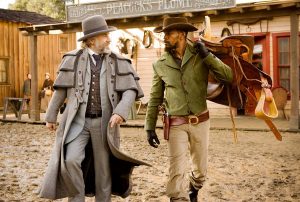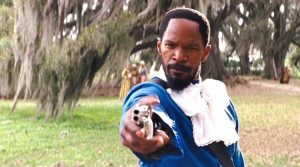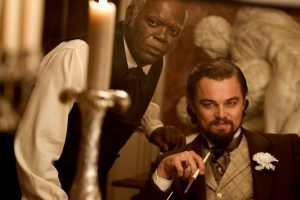64 Django Unchained (2012)
Django Unchained (2012): A Twist on Slavery Films
By Zachary Velasco
Django Unchained, a film about a freed slave who works alongside a bounty hunter to capture evil slave owners, is a blunt portrayal of difference, power, and discrimination in the mid-1800s. Directed by Quentin Tarantino, it has many elements that are indicative of a Tarantino film, especially the extreme, over-the-top violence, and many elements were inspired by classic spaghetti westerns. However, Tarantino set out to make this film unlike any other slavery film that had been made. Many slavery films of the past were problematic, and the slave would often take the high road in the end in favor of the white people. But Tarantino did not want Django to be like that so he took a very different approach and created a film that discussed the difference in power of slaves and white men in the 1850s.
Jamie Foxx plays a slave named Django who was bought by a man named Dr. Shultz (Christoph Waltz), who is actually a bounty hunter in need of Django’s help to identify his next target. They work out a deal and Django agrees to help him in exchange for his freedom and compensation. The two of them then go out and collect many bounties, and ultimately find themselves at the Candieland Plantation where Django’s wife is being held as a slave.

The differences presented in Django Unchained are clear. The difference that has caused so much pain and hurt over the years, the difference in skin color. This was in a time where white men had all the power and black people were often helpless against them and were kept as slaves. This is a terrible scar in America’s past that keeps getting reopened to this day, and the effects of slavery are still felt. The differences between the white people and the slaves during this film were seen through their clothing while the white people wore fancy elegant outfits at all times, the slaves must wear worn down, ratty clothing because that is all that is provided to them by the slave owners. They are also much less intelligent because they have not had the opportunity to go to school or learn much, and in this way the slaveowners keep them obedient and try to prevent them from developing the intellectual ability to know how to escape or fight back. It is only when Django is freed by Dr. Shultz that he is able to choose his own clothes. When he does so he seems shocked that the doctor would let him pick out his own clothes as this is something he’s never been able to do before. Something that we take for granted every day meant so much to Django, and just by getting a new outfit, he was seen with much more respect.

Power is perhaps the most important element in this film. Back then, and still to this day, white men hold much of the power. In this way, they are able to manipulate things to their benefit. This is seen obviously in Django as the film centers around a black, former slave, and his adventures as he enters plantations and engages with many white characters and slave owners. In one scene the racial injustices are seen explicitly. The Plantation owner, Mr. Candie has a dangerous and evil response to his power and uses it in inhumane ways. In this particular scene, he has two of his slaves fight each other to the death purely for his own entertainment. This is a catalyst for Django and makes him even more determined to find his wife in this plantation. “The film is a manifestation of power and resistance between racist White Americans and the oppression of African Americans. The film reflects on the conservative superior classes that exercise their power to mistreat those that are viewed as second class citizens.” (Rwafa, 1). This is still something that is seen even to this day. To take a look at the differences in power in the United States is especially relevant right now regarding the abuse of power by many policemen against black people in the country.
It is also important to note that even though Django did benefit somewhat from this difference in power. Mr. Shultz is a white man and it is greatly because of him that Django is even able to be a free man and enter into the plantation. This can be seen as white saviorism where black people only succeed in a movie because of the help of another white hero. Yes, this is problematic in films but during this time period when black people were mostly powerless they did have to rely on the kindness of white saviors to help them at times. However, Tarantino was wary of this and tried to make Django the hero as much as possible rather than giving all the credit to Dr. Shultz “He’s the one who paid for Django’s freedom, trained him to be a killer, and helped him locate where his wife Broomhilda was sold to. The entire story revolves around Schultz’s influence on Django’s life. It’s no coincidence that Django becomes the real hero of the story after Schultz dies. With him gone, the audience can finally see what should’ve been depicted all along — that Django is the film’s hero.” (James, 1). Dr. Shultz has an influence even over the other white characters. Although he is German and English is his second language, he still speaks it so eloquently that the people in America have trouble understanding his vocabulary at times. He speaks with such intelligence and authority that he is able to manipulate other white characters to fit his agenda.
Discrimination doesn’t even begin to describe what occurred during the time that this film was set. Black people were discriminated against in the harshest way. They were seen as less than human, comparative to animals, and were oppressed in the most evil ways possible for hundreds of years. The injustices could never be described in just one movie, but they are seen often in this film. Django obviously faces discriminatory language from almost everyone he meets, but what was shocking to me was that he faced discrimination even from other slaves. They had racist ideologies so far ingrained in their heads by their owners, that they would be discriminatory of their own kind. The other slaves were all shocked when they first saw Django on a horse because they had never seen a black person on a horse before.
The movie was faced with some sharp criticism, and the morality and justification for Tarantino making this film was brought into question by Spike Lee and other vocal critics. People wondered whether he should be the one to make such a movie, and he was also criticized for his over-use of the n-word. “Tarantino, of course, has long argued that his dialogue simply reflects reality. (The Gangsta Rapper Defense.) It is one thing to reflect a tragedy, however, and another to revel in it. And that tick goes way beyond the rhetoric in this movie.” (Melber, 2). While, yes the use of the word is historically accurate for the time, I do feel that Tarantino may have used this as an excuse to use it excessively. While they might have used it this much in the past, it is a little jarring to hear it being used so much in a movie made in recent years. It was also called into question whether or not it was Tarantino’s place to make such a movie. However, he justifies himself as wanting to create a Western that dealt with racism when so many in the past had ignored that aspect. “I was always amazed so many Western films could get away with not dealing with slavery at all. Hollywood didn’t want to deal with it because it was too ugly and too messy. But how can you ignore such a huge part of American history when telling a story in that time period? It made no sense.”, he is quoted as saying. (Samuels, 1). This was his way at changing the narrative of Westerns that ignored slavery which is very dismissive of the time. He also knew he wanted to make the black characters the main characters rather than the white saviors mentioned earlier. Tarantino even criticized other films such as Roots that depict slavery in an unrealistic manner. In the end of Roots, one of the characters is given the opportunity to beat his former slave owner but does not in an attempt to be the bigger man. Tarantino then criticizes that and claims his intentions for creating Django: “Bulls–t, no way he becomes the bigger man at that moment,” says Tarantino. “The powers that be during the ’70s didn’t want to send the message of revenge to African-Americans. They didn’t want to give black people any ideas. But anyone knows that would never happen in that situation. And in Django Unchained we make that clear.”

I think this movie, while extremely violent and graphic, and with some historical discrepancies does a great job at showing the injustices that black people faced during the years of slavery and how someone may react to those injustices. It is important to create movies that don’t ignore this aspect as that is reflecting on the privilege that we have today where we don’t have to worry about the effects of slavery even though people deal with the repercussions every day. It should still be talked about and not swept under the rug like Hollywood tried to do for years. This film does not rely solely on white saviors or expect the former slave to act like the bigger person when given the chance. It shows the real emotions and anger that someone living through slavery would have no doubt felt, and I think white people should educate themselves more on this topic especially with the climate we are living in today.
In conclusion, this film took many aspects of old spaghetti westerns, and Quentin Tarantino took his own creative liberties to create a film that discussed racism and slavery in the 1850s. They did not shy away from being controversial or overly dramatic, as that was indicative of the times. Things were very bleak for slaves and free black people back then as we can see from movies like Django Unchained, and while the action was definitely dramatized the lesson we can learn from this film are still relevant to this day.
References
Chera, Godknows, and Urther Rwafa. “Manifestations Of Power And Resistance: An Exploration Of Quentin Tarantinos Django Unchained (2012) and Steve Mcqueen’s 12 Years A Slave.” Imbizo, vol. 7, no. 1, 2017, pp. 15–39., doi:10.25159/2078-9785/1768.
James, Janelle. “It’s Time for Hollywood to Say Goodbye to ‘White Savior’ Films.” Revelist.com, www.revelist.com/movies/white-savior-movie-trope/5221.
Melber, Ari. “The Amorality of ‘Django Unchained’.” The Atlantic, Atlantic Media Company, 17 July 2013, www.theatlantic.com/entertainment/archive/2012/12/the-amorality-of-django-unchained/266531/.
Samuels, Allison. “Tarantino Lets Loose.” Newsweek, vol. 160, no. 25, Dec. 2012, pp. 48–49. EBSCOhost, search.ebscohost.com/login.aspx?direct=true&db=a9h&AN=84304152&site=ehost-live.

